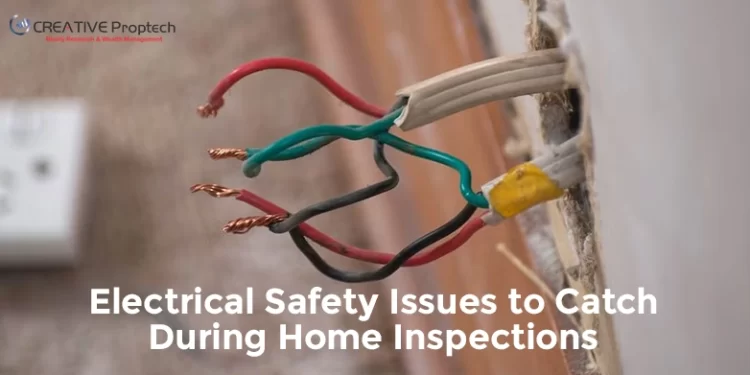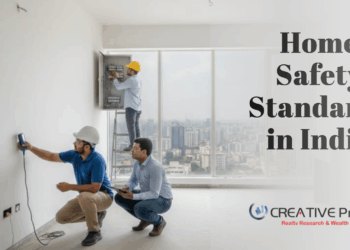Electricity powers everything in a modern home from lighting and appliances to safety systems. But behind the walls, an invisible network of wires, switches, and connections can pose serious risks if not properly installed or maintained. Whether you’re buying a new flat, renting a resale unit, or simply want peace of mind, identifying electrical safety issues during a home inspection is crucial. From outdated wiring to overloaded circuits, catching these problems early can prevent hazards, costly repairs, and even life-threatening situations.
Outdated or Non-Compliant Wiring
Older homes often have aluminum or single-core wiring, which can’t handle today’s high-load appliances. These setups may not comply with current electrical safety standards and can overheat, spark, or fail without warning.

Why Electrical Inspections Matter
Electricity is one of the most crucial—and potentially hazardous—components in any property. In India, many homes face issues like short circuits, electric shocks, or appliance burnouts due to poor electrical work. A home inspection reveals hidden flaws, outdated wiring, and unsafe installations that could pose a fire or safety risk.
Improper MCB or Fuse Box Installations
The Main Circuit Breaker (MCB) should trip instantly during a power overload or fault. However, poor installations, loose connections, or improper segregation of circuits can reduce its effectiveness and lead to silent risks.
Earthing and Grounding Issues
Without proper earthing, appliances like geysers or washing machines can leak current. This can lead to severe electric shocks, especially in wet zones like bathrooms or utility areas. Inspectors use earth testers to verify safety.
Loose or Exposed Wiring
Wires running loosely behind furniture, in corners, or in ceilings can wear out or get chewed by pests. Exposed live wires are dangerous and are often found in older apartments or poor-quality renovations.
Overloaded Circuits and Unsafe Extensions
Plugging too many appliances into one socket using extension cords is common—but extremely unsafe. It can lead to overheating or fire hazards. An inspection helps ensure circuits are properly distributed.
Faulty Switchboards and Power Sockets
Broken switches, wobbly sockets, or reversed polarity in power points are common in both old and poorly finished new homes. Inspectors test socket safety, alignment, and current flow during evaluation.
Unapproved Electrical Fixtures
Unbranded or cheap fixtures may not follow BIS (Bureau of Indian Standards) regulations. They can malfunction, short-circuit, or even explode under high usage. Home inspections flag these issues for replacement.
Safety in Wet Zones: Kitchens & Bathrooms
Electrical points near water sources must be well-insulated, properly earthed, and fitted with water-resistant covers. Any lapse in these zones could be fatal. Inspectors also check the functioning of exhausts and geysers.
Tools Used for Electrical Inspections
Professional home inspectors use:
-
Socket testers: To check polarity and earthing
-
Voltage detectors: To confirm live wires
-
Multimeters: For voltage, resistance, and current flow
-
Thermal cameras: To identify overheating circuits
When Should You Inspect?
-
Before finalizing a property purchase
-
After any electrical renovation or upgrades
-
Before moving into a rented apartment
-
Before monsoon season (to prevent short circuits)
-
If you’ve experienced frequent trips or flickering lights
Conclusion
Electrical issues are often silent but dangerous. A proper home inspection goes beyond aesthetics and comfort—it ensures your safety. By identifying faulty wiring, earthing problems, or overloaded circuits in advance, you avoid fire hazards, shocks, and costly repairs later.
Whether it’s a new flat or a resale unit, make sure a comprehensive electrical check is part of your inspection plan.
FAQs
1. Can electrical issues be fixed after a home inspection?
Yes. The inspection gives you a detailed report, which you can use to request fixes from the builder or hire an electrician.
2. Are electrical inspections included in standard home inspections?
Yes. Most professional home inspections include a full electrical check with tools and testers.
3. What happens if faulty wiring is found?
You’ll be informed in the report. You can request repairs before possession or negotiate pricing for resale properties.
4. Can I inspect electrical issues on my own?
You can spot basic problems, but identifying deeper issues like earthing or polarity needs professional tools.
5. How long does an electrical inspection take?
It depends on the property size but usually takes 30–60 minutes as part of the overall home inspection process.






